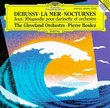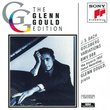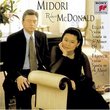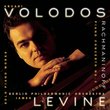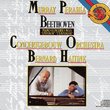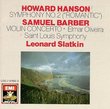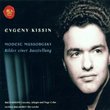| All Artists: Wolfgang Amadeus Mozart, Christoph Eschenbach Title: Mozart: Piano Sonatas [Box Set] Members Wishing: 0 Total Copies: 0 Label: Deutsche Grammophon Release Date: 11/9/1999 Album Type: Box set Genre: Classical Styles: Chamber Music, Forms & Genres, Fantasies, Sonatas, Historical Periods, Classical (c.1770-1830) Number of Discs: 5 SwapaCD Credits: 5 UPC: 028946313725 |
Search - Wolfgang Amadeus Mozart, Christoph Eschenbach :: Mozart: Piano Sonatas [Box Set]
![Mozart: Piano Sonatas [Box Set]](https://nationalbookswap.com/cd//l/84/7584/6077584.jpg) | Wolfgang Amadeus Mozart, Christoph Eschenbach Mozart: Piano Sonatas [Box Set] Genre: Classical
|
Larger Image |
CD DetailsSimilarly Requested CDs
|
CD ReviewsPerfect. madamemusico | Cincinnati, Ohio USA | 08/19/2001 (5 out of 5 stars) "There are so few "perfect" recordings of anything in this world, but this is one of them. Having had a love/hate relationship with the Mozart Sonatas since my college days (30 years ago), I have been through several sets. First, there was Walter Klien: precise, musical, but dull. Then Alicia de Larrocha: warm but mincing and mannered. From there I went to Mitsuko Uchida: not as mincing as de Larrocha, but still mannered and somewhat disconnected in phrasing. Then came Glenn Gould. Gould distorted several movements beyond sensibility, rushing Andantes and over-emphasizing counterpoint to the sacrifice of melody, but when he was not so distorting the music he was terribly exciting. Eschenbach is not, even at his best, as exciting as Gould, but like him he performs these sonatas with a rare combination of forward propulsion, energy and musical phrasing; and in the Andantes he gives us something Gould does not, moments of warmth and sensitivity.As I listened to this set, in fact, I found myself becoming less and less involved in Eschenbach's "interpretations." What I was hearing was, in my opinion, Mozart himself. As Toscanini used to say, "Is like reading the score!" And indeed it is. Every nuance, every phrase, makes perfect musical sense; and if there seems to be a certain sameness to a lot of the music, again one should blame Mozart (who, after all, wrote several of these sonatas "to formula" in order to please wealthy patrons) rather than Eschenbach. My suggestion is to listen to this set one disc at a time in order to savor the music and enjoy the warmth and sparkle of Eschenbach's performances; as a pianist myself, I cannot say enough for his total command of a technique ALWAYS at the service of the music. One may quibble over complete sets of the Beethoven sonatas but, in the case of Mozart, Eschenbach yields more consistent pleasure and score-accuracy than anyone else I have heard." Serene Mozart Shorn of Pretension Christopher Smith | Atlanta, Georgia | 04/11/2000 (5 out of 5 stars) "Christoph Eschenbach is a humble, self-effacing musician, and sadly for lovers of his beautiful pianism, he rarely records nowadays, preferring the conductor's baton (although this collection is a very recent release, all these sonatas were recorded in the late '60's and very early '70's). Throughout all his recordings, you hear a pianist who has a profound respect for the pieces he plays and the composers who wrote them. Eschenbach eschews the egotism of so many pianists, who feel they need to consciously impose some kind of tenuous, "original" vision on well-known, well-loved music in order to carve out a place for themselves in the recording world. Uchida aside, Mozart's sonatas remain unmoved by attempts to meddle with them too freely. Thus Eschenbach has a perfect temperament for Mozart's piano sonatas, since he allows their sublime inevitability to shine through in a clear, direct fashion. To have Mozart speak for himself is more difficult to bring off than it sounds, and one of the delights of this collection is that Eschenbach allows you to divine the emotional content latent in works that were by and large composed as instruction pieces for Mozart's many pupils. Yet in the Fantasy (K. 475), K. 457, and the final two sonatas, where Mozart breaks out and the seeds of Beethoven's early work are clearly evident, Eschenbach is equal to the task, exhibiting a deep comprehension of each works' dramatic structure. I have many of Uchida's recordings, and it is true she does seem to find things in these sonatas that will amaze anyone who thought they were familiar with these works. Thre are drawbacks though. Someone (I think the Penguin Guide) said that the delicate refinement of her Mozart can remind you of fine china. I think of it more as akin to eating too much rich chocolate, and you can tire of her take on Mozart after repeated listenings. For me, Eschenbach infuses an appropriate degree of forcefulness into these rarified pieces in all the right places, so this collection is, I think, the one that I will listen to the most in the future. This set is part of a new, budget-oriented series DG is bringing out, so it's a good buy, and although the packaging is a little awkward, I'm ready for this set to bring me years of pleasure." Eschenbach plays a magnificent Mozart set Molly the Cat | the USA | 02/12/2001 (5 out of 5 stars) "Christoph Eschenbach's Mozart sonata set is exceedingly fine and should please all lovers of Mozart except those hardened souls who absolutely MUST have these works tinkled out on fortepianos; not that I don't like historical instruments, too, but a sensitive rendition of this music, under the fingers of an artist who is not laboring to make it sound like Brahms or Liszt, works quite well on the modern piano.Eschenbach knows how to make this music come alive, and even in the rare instances where I find his approach unusual, I have tremendous respect for it. One striking instance of this is in the rondo K. 494 (the last movement of the K. 533 sonata in F). My mental picture of this as a quick, relatively light-hearted movement is entirely different from Eschenbach's; he plays the movement slowly, apparently mindful of the original tempo (Mozart first marked it "Andante" before changing it to "Allegretto" in the edition he published). Eschenbach's reading is very often on the edge of pathos, but I have to admit that it works.I should also take the opportunity to mention that this set gives a nice bonus with the inclusion of K. 46d and 46e. The liner notes do not make this clear (this is after all a "bargain box"), but these were not originally for piano at all, but rather two-part sonatas for bass and a melody instrument, probably violin, written by Mozart at the age of 12. Eschenbach obviously felt that they were worthy of excavation and gives us a chance to hear these slight but charming works as piano pieces. Since the whole 5 CD set is arranged in chronological order (unlike the bargain box of Andras Schiff's Mozart sonatas on London, this set's closest competitor), one gets to hear the development of Mozart from the boy who wrote the small-scale K. 46d and e to the transcendent genius who concluded his sonata writing with the masterpiece K. 576.Eschenbach recorded these sonatas between 1967 and 1971, as another reviewer has pointed out. Another famed pianist who was also working on Mozart (or working Mozart over, depending on your perspective!) at the same time was Glenn Gould, recording for Columbia his notorious set of these sonatas. It's too bad Gould, for all his talent, couldn't have gotten over his "Wolfgangophobia" long enough to take a few lessons from Eschenbach in how to value this music and make it sing. As is obvious from this recording, Eschenbach has captured the essence of Mozart, something that completely eluded the celebrated Canadian pianist."
|

 Track Listings (16) - Disc #1
Track Listings (16) - Disc #1